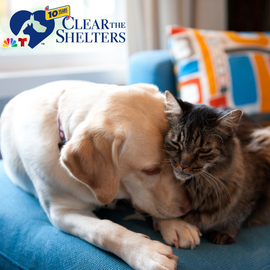Foster FAQs
Our fosters make it possible for us to rescue more animals and save more lives. We couldn’t do it without you! Check out these FAQs we’ve compiled to assist you as a HT foster. You may always reach to your Adoption Coordinator for additional support.
We prefer that you commit to fostering your animal until an adoptive home can be found. Unfortunately, we cannot predict how long this will take. It depends on the animal’s breed, age, temperament, and the time of year, as well as how proactive you are about marketing your foster animal and attending adoption events. If you can only foster for a specific period of time, please be certain to indicate this upfront to the HT representative with whom you are working. Sometimes another foster home can’t be found, which means that your animal must go to a boarding facility. We prefer to avoid boarding animals because it’s both stressful for the animal and expensive for HT. Still, if you find you cannot continue fostering your animal, contact your HT representative immediately to make alternate arrangements.
Contact your HT representative before proceeding. Vet care for foster animals must be provided by an approved vet partner in order for the costs to be covered by HT, as noted in your signed foster agreement. You may refer to your foster handbook for a list of approved vets or ask your HT rep. If you take your foster animal to a vet other than an HT partner and have not received special approval to do this, you will be responsible for paying the bill. With very limited funds, HT must utilize the partnerships we have whenever possible. This is very important and non-negotiable.
If you think your foster needs a vet visit, contact your HT representative to determine whether vetting is necessary. Our medical team is able to provide a variety of services, and there are many ailments for which HT keeps treatment supplies on hand in our Med Shed (worms, kennel cough, coccidia, etc.). If a visit is deemed necessary and it is a non-emergency issue, simply contact an HT vet partner to make an appointment. You are then responsible for taking the animal to the vet. If your schedule does not permit, you will need to find another HT volunteer to take the animal.
We always want to make sure all of our animals get the very best medical care—especially in the case of an emergency. If your animal has an obvious and clear emergency (hit by car, serious fight with an animal, ingestion of dangerous object), contact your HT representative and inform them that you will be taking the animal to your nearest emergency vet. HT does not usually receive discounts from emergency vets, so you will likely go to your nearest emergency vet. Again, as much as possible, any emergency vet visit needs to be approved by your HT rep.
Homeward Trails feels that foster volunteers should, as much as possible, be involved in making the decision regarding the home in which their foster animal gets permanently placed. We recognize that you have probably developed a close bond with your foster animal and want to make sure they find the best home. You will need to work closely with your Adoption Coordinator to determine if an adopter is suitable. Together, you will work as a team to determine adopter suitability for your foster animal.
HT will make every effort to ensure a good and safe foster match. However, there are times when this will fail. In this case, contact your HT representative as soon as possible. If the issues are minor, HT will work with you to address them. Many times, problems can be solved by trying a few new things and/or by giving the animal time to adjust to your home. For example, we can switch crates, switch foods, or offer simple behavioral solutions to try. We may also have a trainer work with you. Other times, an animal may simply not be a good fit for your home or lifestyle. HT will always take the foster animal back if an issue cannot be resolved. However, we ask that you give us at least 24 hours to make a plan. If that is not possible, we will make emergency arrangements. HT never wants to put the safety of the foster person, their own animals, or the foster animal in jeopardy.
Yes, so long as we all feel it makes sense. But keep in mind that adopting your foster animal may mean that you can no longer foster. We’ll be sad to lose you! Think through the decision carefully so that you are not deciding to keep the animal solely because it is too difficult to let them go. The first few foster experiences can be difficult, as you’ll get attached and may have trouble letting go. But remember, your role as a foster person is invaluable! As an adopter, you may only be able to save one animal’s life, but as a foster parent, you have the potential to help dozens of animals. You will need to work with your HT contact person to discuss whether your adoption is truly in the best interest of your foster animal.
Please notify us ahead of time so that we can make arrangements for your foster animal to go elsewhere while you are gone. Some foster people who have other pets have dog sitters who will also watch their foster dog. Other foster volunteers like to travel with their foster dog. Others may have a boarding facility they work with. We are open to ideas but generally cannot afford to cover the costs of dog sitters or expensive boarding facilities. If you wish to pay for these options once they are approved by HT, that is great (and can be considered a donation)! If you cannot, HT will allow you to make arrangements either with one of our boarding partners or with another foster volunteer. Be sure to give us enough warning so that we can help you make these arrangements. Keep in mind that holidays can be difficult to find space and are expensive. The more advanced time we have, the better!
Contact your HT representative right away. We will work with you to find a suitable option or have you bring the animal to one of our boarding partners.
Absolutely, but only after you get to know the dog and know that they will do well in that environment. Going to the dog park prematurely may result in a fight. We don't want to risk your foster dog's safety and want to avoid expensive vet bills. NEVER take your dog off-leash unless you are in a fully fenced, secure area. Be aware, too, that some dogs like to climb or jump fences, so be sure to pay close attention the first time you take your foster dog off-leash. You will be surprised at which dogs like to and can jump fences! Your foster dog should always have an ID tag with contact information on it. This is vital. Putting your foster dog in a situation that could bring danger to him or others is something every foster needs to think about carefully.
We highly recommend it! We cannot guarantee that a dog is housebroken, won’t chew your items, and won’t hurt itself when unattended. The safest way to protect your home and the dog is to use a crate. HT cannot be responsible for damage done by a dog left unattended and uncrated. We also cannot guarantee that we will pay the vet bill if you choose to leave the dog uncrated and the dog or your own pet is injured. We have lots of experience in this area! In time, you may find your foster dog doesn’t need the crate. But make that decision only after you “test run” the dog a few times and really get to know the dog and their behavior.
To prevent this, we strongly suggest that all your pets be current on their vaccinations, use flea and tick prevention, and have the Bordetella vaccine (for kennel cough). In order to prevent your pet from getting intestinal worms, which are passed through the animal’s stool, you should pick up each dog’s stool immediately or have your foster cat utilize a separate litter box until we are sure that your foster is rid of any and all potential worms. Pets that are current on their vaccines usually will have no problems with foster pets, or the problems that do arise are small and very easily addressed. If your animal is fully vaccinated and you follow the above protocol but your own pet still contracts an ailment from your foster, contact your HT representative. We will determine whether or not we can pay for treatment. Do not go to your vet expecting reimbursement. Check with your HT rep to see if we have meds in the Med Shed that we can provide you free or at cost. We will evaluate each case individually.
In most cases, yes! Animals that were turned into a shelter, however, may have had their names for years. In that case, we recommend against giving them a new name or suggest you find a name similar to their existing one. If you have any question about this, contact your primary HT representative.
Purchases made for foster care are considered donations to Homeward Trails Animal Rescue and are tax-deductible. Keep your receipts, and we will be happy to issue you a tax donation letter. If you want to be reimbursed for a purchase, you must get prior approval from your HT rep. Again, you must get approval from your HT rep if you want reimbursement.


